Persona 5 Royal: The Wings of Rebellion
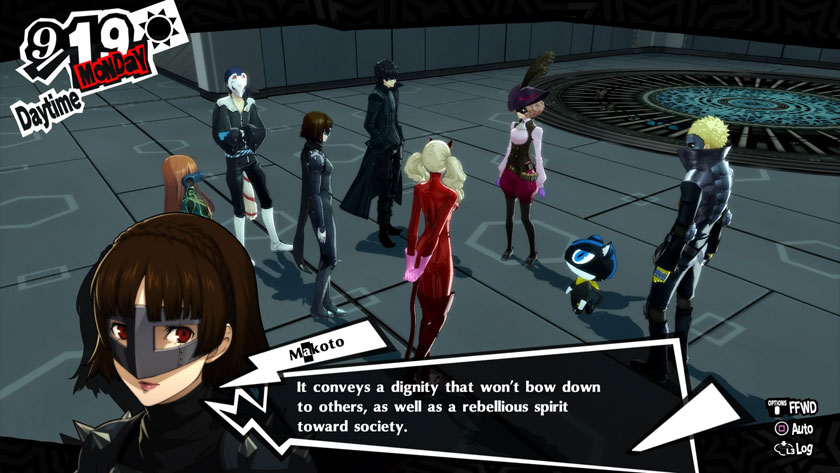
I had never heard of “The New Breed” until I read You Gotta Have Wa, the book by Robert Whiting that I referenced heavily in my prior write-up on Persona 5 Royal. Hiromitsu Ochiai was one of the baseball players detailed within the chapter, often outspoken against the traditional mentality of “fighting spirit” within the sport. He was a member of the shinjinrui, the “new breed” generation of young adults in the 80’s that were embracing individuality.
I could not help but wonder what happened to this generation, old enough now to be managing companies and even preparing for retirement. In 1988 the New York Times wrote that this “New Breed” favored forty-hour work weeks, vacation time, and the freedom to switch companies and careers over the excessive loyalty to one’s company – and therefore the excessive work hours spent – that their parents and grandparents bore. The affluent lifestyle of this generation – referred to as “Juppies” by the Chicago Tribune the same year as the Times article – more closely resembles that of a middle-to-upper-class American life than what one might expect of a Japanese.
So why is it that a modern piece of Japanese pop culture like Persona 5 Royal would represent older generations – those that would have been young adults of this “New Breed” in the 80’s – in a harsh light that favors all the old traditions they’d supposedly rebelled against? What happened to that “New Breed” and its desire for reasonable work hours and a comfortable lifestyle?
It turns out that it wasn’t just the affluent young adults that were gluttonously revelling in their excess. The entirety of Japan’s economy came crashing down in the early-to-mid 90’s due to irresponsible spending and poor investment, and the consequences are still being felt today.
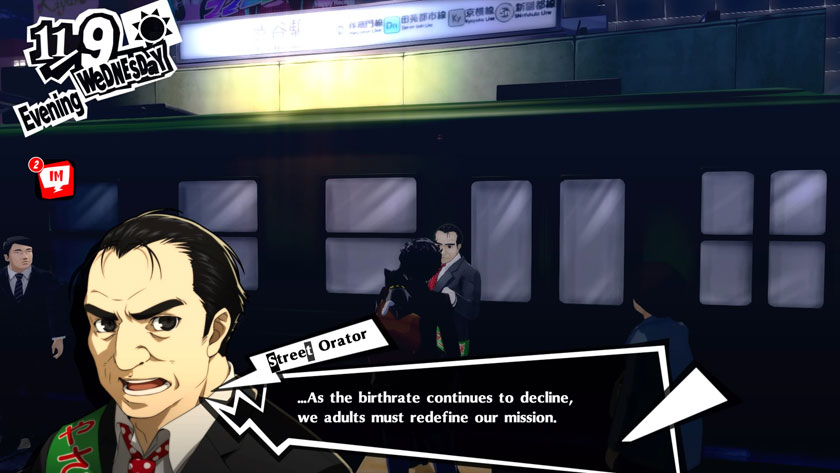
How is the bubble era seen today?
Nostalgically by those who remember when they had money to burn, with embarrassment by those who reflected on the attitudes and policies, or lack thereof, that led to it, and with anger by those who see the period as the moment in Japan’s history when the country abandoned its traditional moral, social, cultural values and became greedy in an allegedly Western or American sense.
Unfortunately I do not have enough information to construct a proper timeline of causality. I only have enough to speculate. However, it seems that the bursting of the economic bubble caused the New Breed’s rebellious sense of individualism and affluence to come to a screeching halt. The job market once again became competitive as companies closed their doors left and right. Thirty years later, the economy has never quite recovered. It isn’t as bad as it had been, but there has continued to be an uneasiness among the populace ever since.
What’s more, this situation has provided these companies the opportunity to exploit their employees. As written in The Atlantic back in 2017:
[Daiwa House Group] advertised itself as a great place to work, but [Jou] Matsubara, who was a wrestler in college, told me it soon became evident that it was anything but. Though company employees left work at 7 p.m. on paper, Matsubara said he was required to work until late at night almost every day. Employees were required to sign off at 7 p.m., even if they were still working, and were given iPads so that they could do so even if they were out of the office at meetings. If they didn’t sign off, they’d get a call on their cellphones brusquely asking them to sign off immediately but keep working, he said. “The amount of time you’re actually working and the amount of time that is recorded you’re working have absolutely no relation to each other,” he said.
A decade prior, W. David Marx dug into criticisms of Japanese youth and the education system on the website Néojaponisme, exposing contradictions between the Japanese values and what the education system was actually teaching.
When only the top elite of society can make it through the narrow door to jobs where the wages actually increase over time, those standing silent on the peak of the Bell curve are probably more willing to consider the values of their non-fun-deferring classmates a few standard deviations behind. The conservative critics, however, believe that attempts to make the education system less of a device for nation-state building has only produced dumber kids. They may have a point: if the entire economic and employment system still rewards those that excel at the older goals of the education system, the “yutori” changes have only given them false hopes that they will be valued for their individuality and creativity.
The situation has also given rise to the NEET (Not in Education, Employment, or Training). Not to be confused with the unemployed, the NEET is one who voluntarily refuses to work or engage in education. My first introduction to the concept was in the anime Eden of the East, where many of its NEET characters were a rebellious sort refusing to engage in the corrupt bureaucratic world of white collar business. The ultimate goal of the protagonist within that series was to “save Japan” by meeting in the middle between the NEETs and the old guard.
That anime was first released in 2009. If articles and pop culture entertainment are still addressing these same issues, it indicates that Japan has been frozen in this state of anxiety and economic concern for a very long time. As the piece from the Atlantic noted, the inability to find stable employment or earn a decent wage is preventing men and women from marrying and having children. It is, after all, a “traditional” society where women expect and are expected to quit their jobs upon giving birth. The male is still perceived to be the breadwinner in a culture where it is increasingly difficult to support yourself alone. How can one also be expected to support a whole family with such low wages?
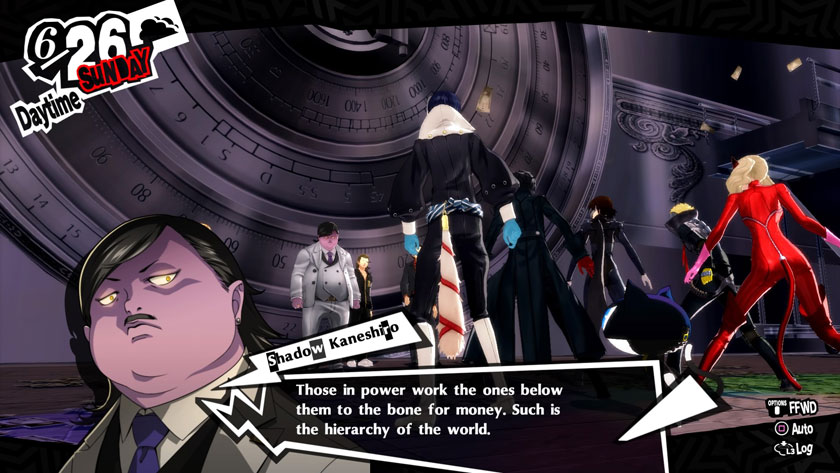
I also believe this scenario has perhaps given rise to the increasingly escapist Otaku, but that speculation is perhaps best saved for another time. For now, let us focus on how this situation is relevant to Persona 5 Royal. Last time I had examined how the game’s opening scenario was grounded in real possibility by examining academic scandals within the U.S., Japanese concepts of Wa (harmony) and “face”, as well as the laborious traditions of fighting spirit and work ethic that were more likely to result in harm than benefit.
Having now beaten the game, it has become clear that it isn’t about the conflict between the older generations and youth as I originally thought. Not exclusively, at least. The conflict begins as such in order to illustrate how early the citizens of Japan are beaten down by their own society, thrown into this meat grinder that promises a never-ending cycle of excruciating effort for little reward. Teachers promise College recommendations to hard working students with no intention of delivering on their promise. The student body is exploitable and disposable, with no concern for the fate of the individual once they’ve passed beyond the school’s doors.
Regardless of whether these students attend College or not, they are likely to find themselves thrown into yet another meat grinder. Whereas High School offered a beacon of hope in the possibility of attending a good university that could land a rewarding job, most employment simply turns into the exhausting, endless death march as experienced by Jou Matsubara at the Daiwa House Group.
Which is why the mysterious location known as Mementos is so important. Shortly after discovering the Metaverse, the parallel reality occupied by the lavish palaces constructed by the delusional conceit of our antagonist adults, our heroes dive into this twisted interpretation of Shibuya’s underground. Whereas a palace is one individual’s cognitive understanding of their immediate surroundings or how they perceive a location integral to their lifestyle, Mementos is a metaphysical creation of the general public; an imitation of a subway system that burrows ever downward. Within this alternate dimension the heroes can confront and steal the hearts of other manipulative targets, such as womanizing men that pit girlfriends against one another or, quite frequently, employers that treat their subordinates like slaves and take all credit for their efforts.
Often these targets give the sense that the trash rolls downhill. Either fear of their superiors drives them to behave in a negative fashion, or having been treated poorly by others has encouraged them to unleash their frustrations upon the rest of the world. The game gradually paints a picture of people caught in a cycle, left to be trod upon or to be burying others under their own heel.
The fame of our protagonists, bearing the name of The Phantom Thieves, grows as they steal the hearts of higher profile targets one by one. Eventually, however, public opinion turns against them and towards another. A representative of hope. This shift in public opinion indicates the desire for the people to latch onto some sort of promise of a brighter future. Communal catharsis is achieved first by watching the unjust get punished by the Phantom Thieves, yet a single mishap is enough to obliterate any hope placed upon the shoulders of our teenage rogues. It is only when a charismatic politician takes the stage that people believe there’s a path forward, a lighthouse beacon to follow through the dark nights.
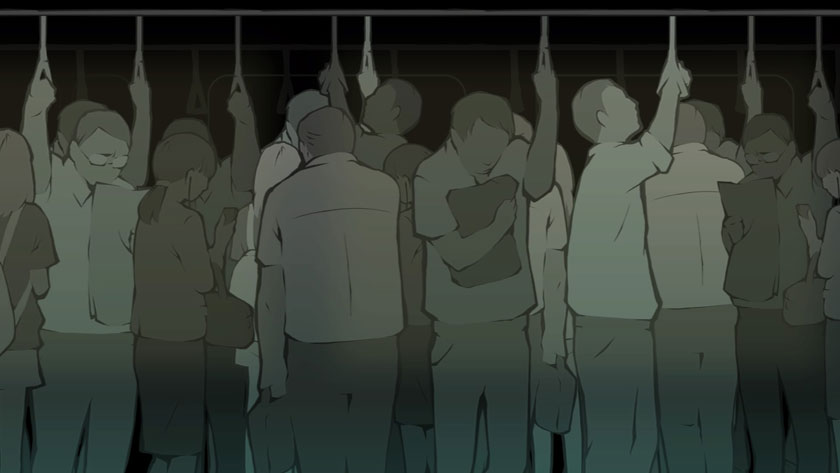
The metaphors of the game are such beautiful and stylized sledgehammers, bashing the player in the face to the beat of a catchy tune that you can’t help but tap your foot to. Of course Mementos takes place in the subway, the claustrophobic tunnel that traps students and employees alike in their locked path towards a dreary day of labor and hopelessness. Every transition represents the citizens in muted colors, looking exhausted and worn out. Each salaryman walking the separate districts of Tokyo has a hunched back, as if bearing the weight of their entire company. It is no question that Persona 5 Royal and its director Katsura Hashino wanted to capture this eternal slump that Japan’s populace has been caught in since the economic bubble burst.
It is the apathy and desperate desire to believe in anything that our Phantom Thief heroes rebel against, each of their Personas resembling a popular historical or fictional character that acted outside of the defined rules of society. From the protagonist’s first Persona named after Arsène Lupin, a gentleman thief who often targeted the evil and corrupt, to the likes of Zorro and Robin Hood that fight alongside. In fact, every protagonist’s Persona is a deep cut reflecting the personality or struggles of that character.
Even the guillotine, a symbol of the French Revolution, plays a central role in the game’s mechanics. One must strengthen their Pokémon-esque Persona beasts through various forms of execution, the first and most common of which is to behead them. Yet this is about as far as the stylish representation goes, both a motif of the protagonist’s shackles to fate and their role in an uprising.
Precisely what sort of rebellion is painted by these Phantom Thieves? Unsurprisingly, a far more tame and pacifist one than the French certainly experienced. It is a rebellion perfectly suited to a group of teenagers, young men and women leaving their childhood behind to discover their identities and define their adulthood. Back when I discussed Danganronpa, I had brought up the concepts of honne and tatemae, one’s true inner self and the outward mask worn in society. Those that play the game are certainly aware of the visual of characters tearing a mask from their face, a painful gesture that consequently releases their Persona. Every instance a character removes that mask, they are pushed to their limit, releasing their true inner thoughts to the world for the first time. It is the removal of one’s tatemae.
It is an individualistic action that had me wondering if Hashino himself was a member of the shinjinrui, the new breed that had rejected much of Japan’s tradition in favor of a more individualistic lifestyle. I cannot find any information regarding the man’s age, though based on his career I feel that he may have been too young to be a member of that affluent era. However, I do believe he is old enough to have remembered that brief indulgent period of Japan’s history.
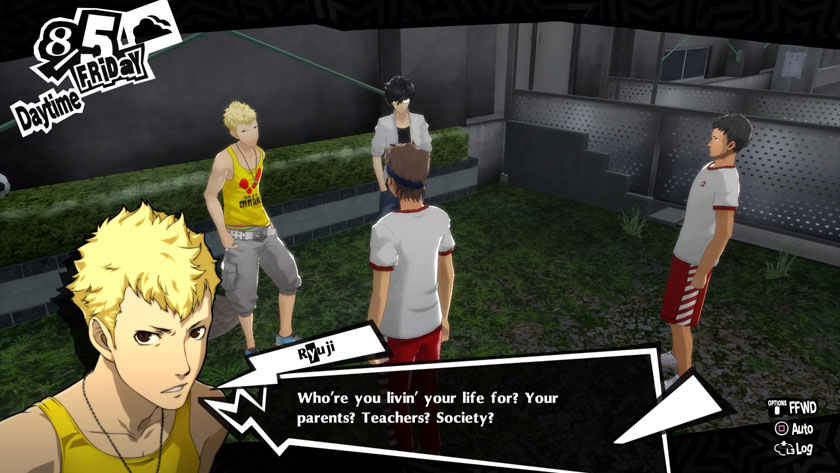
I cannot make claims to Hashino’s goals, but it does have me curious if the ultimate message is something in-between the individualistic new-breed lifestyle and the Wa-focused traditional world view. After all, the current structure of Japanese society allows a selfish few to profit off of the hard sacrifices of the many, using old-fashioned rhetoric to justify their position. An endless cycle of a system that promises nothing but misery and death for the citizens of Japan.
What the Phantom Thieves represent are the courage to assert one’s individuality, but not for any sort of material benefit like the shinjinrui had lived for. The Phantom Thieves themselves are a family of individuals whose greatest interest is in Japan and the lifestyle of their fellow citizens. It is a middle-ground that calls younger generations to live not for some vague promise of a College recommendation, but to instead live true to yourself and your desires.
The question is whether some vague call to be individualistic yet considerate can result in any sort of practical change. Simultaneously, this is all just conjecture. I am a foreigner making assumptions based on what research I can conduct from my computer chair, few interviews crossing into such deep territory to supply confirmation or rejection of my theories.
Regardless of the validity of my analysis, I found myself thoroughly pleased by the ending of Persona 5 Royal. The game itself was wise enough not to promise a brighter future, for all we can do is put our best foot forward and work for a better tomorrow. At the end of the day, what really mattered was that our heroes never bowed to the ideas of hopelessness and futility. They never abandoned their conviction. They fought to the end.
They were Phantom Thieves, a new breed of rebel hero.


